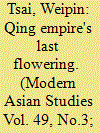|
|
|
Sort Order |
|
|
|
Items / Page
|
|
|
|
|
|
|
| Srl | Item |
| 1 |
ID:
126150


|
|
|
|
|
| Publication |
2013.
|
| Summary/Abstract |
This paper looks at the establishment of experimental winter overland postal routes in the late 1870s and 1880s, which eventually led to the creation of the Great Qing Imperial Post Office in 1896. The history of this experiment sheds much light on important issues in the establishment of what was to become the country's most crucial information-bearing network, in particular those related to collaboration and negotiation between foreign and Chinese officials, and those between local interests and the central authorities. It also explores how foreign processes and management had to be adapted in order to function in a Chinese context.
In March 1878, Robert Hart, inspector general of the Chinese Maritime Customs Service, instructed Gustav Detring, commissioner of Tianjin Port, to investigate the possibility of introducing overland public postal routes in China, beginning with Beijing to Tianijn, Niuzhuang, Yantai, and then to Zhenjiang, a treaty port on the lower Yangtze River.
The three main challenges involved were: to establish a reliable workforce, to design appropriate routes, and to win the cooperation of local governing officials. Although the winter service was initiated on time, problems repeatedly arose from each one of these challenges.
|
|
|
|
|
|
|
|
|
|
|
|
|
|
|
|
| 2 |
ID:
139691


|
|
|
|
|
| Summary/Abstract |
The Great Qing Imperial Post Office was set up in 1896, soon after the First Sino-Japanese War. It provided the first national postal service for the general public in the whole of Chinese history, and was a symbol of China's increasing engagement with the rest of the globe. Much of the preparation for the launch was carried out by the high-ranking foreign staff of the Chinese Maritime Customs Service, an influential institution established after the first Opium War.
With a mission to promote modernization and project Qing power, the Imperial Post Office was established with a centrally controlled set of unified methods and procedures, and its success was rooted in integration with the new railway network, a strategy at the heart of its ambitious plans for expansion. This article explores the history of this postal expansion through railways, the use of which allowed its creators to plan networks in an integrated way—from urban centres on the coasts and great rivers through to China's interior.
|
|
|
|
|
|
|
|
|
|
|
|
|
|
|
|
|
|
|
|
|